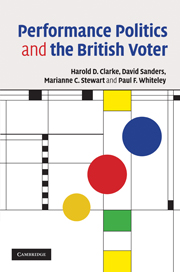Book contents
- Frontmatter
- Contents
- List of figures
- List of tables
- Acknowledgments
- 1 Performance politics and the British voter
- 2 The theory of valence politics
- 3 Valence politics and the long campaign
- 4 Tony's war
- 5 Electoral choices
- 6 The short campaign
- 7 Voting and political participation
- 8 Performance, people and the political system
- 9 Performance politics reconsidered
- Appendix A Vote in 2005 by socio-demographic characteristics
- Appendix B Turnout by socio-demographic characteristics
- Appendix C Dynamics of party identification
- Notes
- Bibliography
- Index
6 - The short campaign
Published online by Cambridge University Press: 06 January 2010
- Frontmatter
- Contents
- List of figures
- List of tables
- Acknowledgments
- 1 Performance politics and the British voter
- 2 The theory of valence politics
- 3 Valence politics and the long campaign
- 4 Tony's war
- 5 Electoral choices
- 6 The short campaign
- 7 Voting and political participation
- 8 Performance, people and the political system
- 9 Performance politics reconsidered
- Appendix A Vote in 2005 by socio-demographic characteristics
- Appendix B Turnout by socio-demographic characteristics
- Appendix C Dynamics of party identification
- Notes
- Bibliography
- Index
Summary
Election campaigns are always a time for rhetoric — sometimes very fiery and highly negative. Heated exchanges between Conservative leader Michael Howard and Prime Minister Tony Blair during the 2005 campaign provide excellent illustrations. In a speech about halfway through the campaign, the opposition leader declared:
Mr Blair started his campaign by lying about our spending plans. When it became clear that he could not sustain these claims, he dropped them. Now he denies making them and he's resorting to false claims about our plans for hospitals … How can anyone trust Mr Blair when his campaign is based on these lies? It's time Mr Blair started telling the truth and had an honest debate about the real challenges facing our country.
(Smith, 2005: 114)Not to be outdone, Tony Blair attacked the Conservatives, particularly on the issues of asylum and immigration:
The Tory party have gone from being a One Nation party to being a one issue party. Afraid to talk about the economy, embarrassed by the sheer ineptitude of their economic plan, unable to defend their unfair and elitist NHS and schools policies, unable to explain how they would finance the extra police they are promising, they are left with this one issue campaign on asylum and immigration.
(Smith, 2005: 150)The leaders' caustic remarks may have reflected the fact that they believed there was more at stake in the 2005 election than was the case four years earlier. In particular, the Conservatives began the 2005 campaign with high hopes of regaining power after eight years in the political wilderness.
- Type
- Chapter
- Information
- Performance Politics and the British Voter , pp. 192 - 230Publisher: Cambridge University PressPrint publication year: 2009



